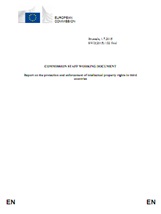Европейская Комиссия опубликовала отчет о защите и применении прав интеллектуальной собственности в странах, не входящих в ЕС. Несмотря на положительные тенденции и всеобъемлющие правовые реформы, правоприменительные инициативы и создание специализированных судов по интеллектуальным правам две трети товаров, задержанных на границах ЕС в 2013 в связи с подозрениями на нарушение прав интеллектуальной собственности, поступили из Китая. В этой связи Китай сохранил статус приоритетной страны. Индия также вызывает обеспокоенность, в частности, в связи с отсутствием там эффективной защиты патентов.
В отчете также подчеркивается общее ухудшение в сфере применения и защиты прав интеллектуальной собственности в Аргентине, России и Эквадоре по сравнению с данными, опубликованными в предыдущем отчете 2013. Поэтому Европейская Комиссия повысила эти страны в списке приоритетов.
Russia
Some improvements have taken place in Russia in the last 2-3 years, most notably major amendments of the Civil Code. These amendments represent a step in the direction of internationally accepted practices. They encompass a wide range of issues, from rules on substantive IPRs and their subject matter to regulation of IPR in the digital environment. Some of these amendments will only come into force in 2015, and it is premature to make full assessment of their impact. Another welcome improvement is the establishment of a specialized IP Court, which acts as both a court of first instance and as a court of appeal since mid-2013. The IP Court's competence does not, however, extend to copyright and related rights cases. Concerns and areas for improvement and action Despite the recent improvements in legislation, application of which is yet to be seen and assessed, IPR enforcement remains an issue in Russia. Massive markets of pirated content and counterfeit goods continue to exist and flourish, both physically and online. The widespread availability of IPR-infringing content hinders entrance of legitimate service providers into the Russian market. For example, Spotify has announced a cancellation of launching its service in Russia for the foreseeable future. Enforcement procedures in general are still slow and inefficient, which is a particularly negative sign in a country where infringing goods are not only imported but also domestically manufactured.
The Commission notes that Russia has announced its decision launch a pilot project to legalize parallel imports, i.e. apply international exhaustion of trademark rights for selected sectors, which might further aggravate the issue of counterfeit goods influx into the country. Respondents to the IPR Survey report that the procedures for IPR crime investigations are inefficient and cumbersome, and the penalties are non-deterrent.
In addition, Russia’s current Criminal Code does not allow for corporate entities to be held criminally liable. This, along with high thresholds for applying criminal procedures, apparent reluctance by enforcement authorities to take action against large infringers and poorly staffed IPR economic crime police has led to a significant decrease of initiated IPR crime cases in the last years. In addition, the number of administrative cases has, like the number of criminal cases, fallen significantly in recent years.
Under its WTO commitments, Russia has undertaken to implement a six year term of regulatory data protection. Nevertheless, the amendments to the law "On circulation of pharmaceuticals", which were signed into law on 22 December 2014, leave it open to later implementing acts and practice to ensure effective non-reliance on the original data until the expiry of the 6 years period. EU action Due to the state of overall bilateral relations, the IP Dialogue between the EU and Russia has been put on hold since December 2013. Nevertheless, OHIM together with Rospatent is implementing a project aimed at the alignment of Russian and EU trademark and designs regulations, drafting guidelines for the examination thereof in order to streamline Russian application, registration and processing procedures and approximate them to the EU approach, modernization of quality and automation processes for prosecution of the trademark and design applications, and improvement of accessibility to information on Russian trademarks and industrial designs.
In the course of the last few years, the Commission has addressed a number of letters to Russian government officials on several IPR issues. Even now, in the absence of regular face to face contacts with the Russian authorities, the Commission continues to deliver IPR-related messages via the EU Delegation in Moscow. The Commission remains committed to maintaining a constructive way of communicating with the Russian authorities on IPR.
Источники:
http://trade.ec.europa.eu/doclib/press/index.cfm?id=1349
http://trade.ec.europa.eu/doclib/docs/2015/july/tradoc_153600.pdf

Комментариев нет:
Отправить комментарий